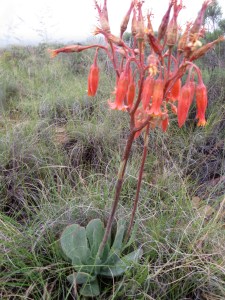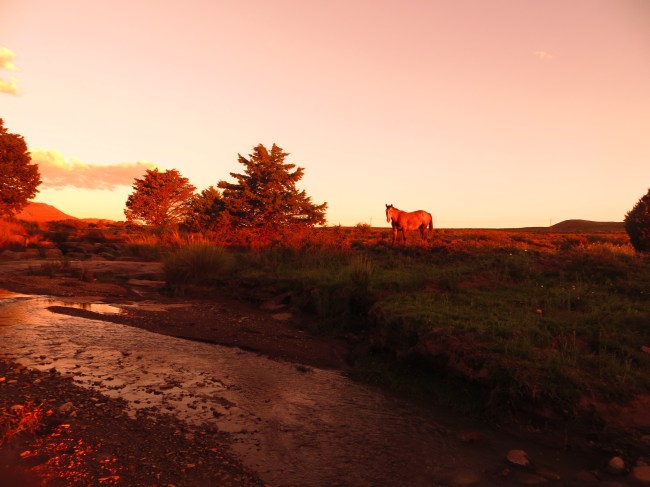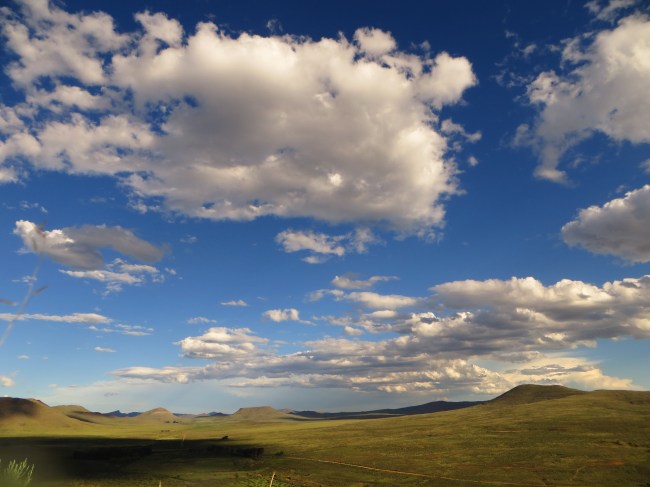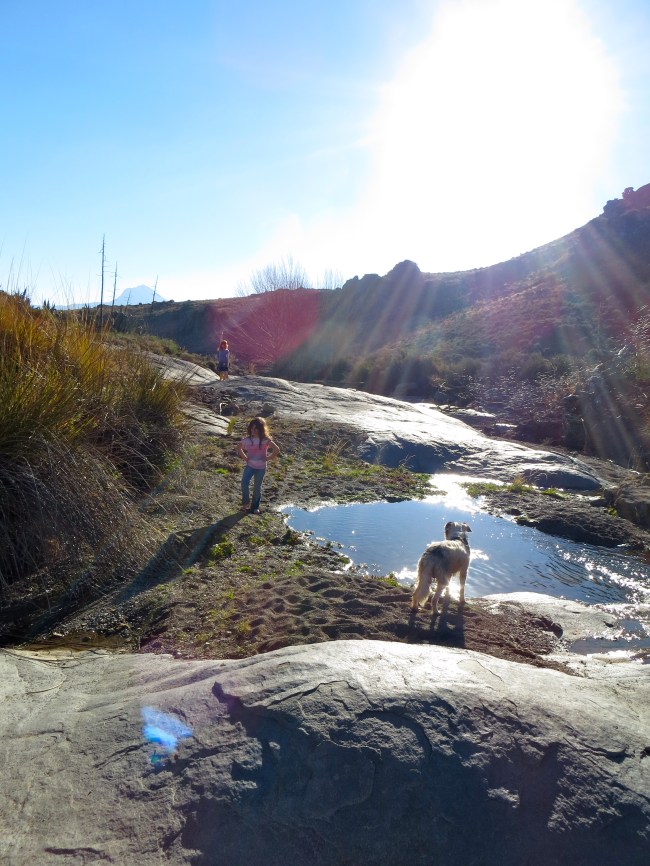I have not posted since Mandela passed away, I have been out of town in the Karoo. Taking some space in the Karoo on the farm where I grew up has given me some new perspective. I feel very privileged to have access to the beautiful place where I grew up. The Karoo is a semi-desert region of South Africa. It is one of the oldest geological regions of South Africa, which has remained stable for aeons. It was once an inland ocean. My (maternal) Grandmother, Dr. Edna Plumstead, was a geologist and palaeontologist. In her time and as one of the only women in her field, she was one of the worlds foremost authorities on Gondwanaland plant fossils (and often got into arguments with bullheaded and egotistic males who refused to believe in the possibility of continental drift. The idea that all the continents had once been one, was very controversial at the time- just as climate change is not accepted by some now.) She was chosen to identify plant fossils brought back by the Sir Edmund Hillary and Sir Vivian Fuchs on the commonwealth Trans-antarctic Expedition of the late 1950’s. These fossils were vital key evidence supporting the theory that the continents had once been a large landmass, which had drifted apart.
My grandmother taught us as children about fossils. Once I found a bird-like footprint on a pebble and she confirmed that it was a dinosaur’s footprint: some kind of prehistoric bird creature. There are many amazing reptile fossils in the caves along with Bushmen’s paintings and tools.
The land is so ancient and has so many stories to tell. But this season was a beautiful one. I have never seen the veldt so green and there were all kinds of flowers, I had never seen before. Many have powerful medicinal properties.

Every evening there were thunderstorms. The rain flowers came out and smelled so sweet that all the insects came buzzing to get some yummy sweetness. It was Christmas dinner for them every day.
The river, which is usually a tiny trickle turned into a raging torrent and my husband, who unwisely tried to cross it, nearly got washed away, much to the horror of my daughters who were watching. Luckily he clung to a root and managed to drag himself out looking like he had survived a big wave.
.
The power of nature is un-escapably immense. When we are in our comfort zones in the city, it is so easy to forget that, but when one is out there in that extreme wild open place, there is no denying it.
Yet, not more than a few weeks after returning to the city I am paging through the Cape Times, one of the main newspapers in Cape Town when I discover a tiny brief less than an inch in size announcing that the minister of minerals and energy has given the go ahead on fracking in South Africa. It is not a small story, but someone somewhere decided to whisper it, so that nobody would notice.
It was expanded on in the business section: a column, dwarfed by a large collage featured image with a man holding a petrol pump and graphs showing the rand vs. dollar exchange. It was Feb 5, the day that the price of petrol went up by 39c a litre, and creating a record high for petrol at a time when inflation on food prices are already shockingly high. In what some South Africans may have found a comforting contrast to this stressful situation, the column explained that our minister Susan Shabangu has stated that South Africa would move ahead “decisively” with exploration of shale gas and “geology indicates” a potential for 483 trillion cubic feet of shale gas trapped in formations in the Karoo region. She said that the government would “unleash” the potential of shale gas to provide cost-competitive energy security and create jobs.
It is one of the last clean and pristine places on the planet. Surely this is worth more than that greedy gas idea, which is actually avoidable. Solar and wind and other renewable technology do create jobs and empower people, but perhaps in view of our current decision makers, it does not empower the right people – the people who already have the power to make the decisions and who want more more more. (Who are these decision makers? What criteria sets them signing on that dotted line? Is it not actually the corporate with the bribing power, who sways the final feather?)
Perhaps if Susan Shabangu was asked the question: which is more important? Your health or your wealth? She may have a little trouble going ahead on the fracking idea. And when it comes to the millions of workers who may potentially get jobs through this industry, that question will have to come up again. Health or weatlh? They may make a few bob, in the short-term but they may be risking their health for the rest of their lives. And the landowners who may or may not have a choice on whether their land gets fracked, will have to make that big decision too. The choice between health and wealth may not be what comes up for them, when they are made the offer, but it will certainly come up in retrospect when they begin to feel the impacts.
I do not believe the documentaries Gasland, and Split Estate made up all those interviews with sick people living in the state of Wyoming who were suffering incredibly painful chronic ailments as a direct result of the fracking industry. I find it so tragic that the American people allowed Wyoming – a state that I read about in the classic childrens series “My Friend Flicker” and “The Green Grass of Wyoming” as a child, allowed such a beautiful place to be destroyed. It is such a shame that they allowed an ancient sacred site of the Native American peoples – where the largest ancient Medicine Wheel still exists. But an aerial view of Wyoming, shown in the documentary Split Estate, shows the countryside is scarred by fracking in a way that I find horrifying. (And that is just one state of many that is fracked to pieces-filled with millions of wells and all the waste ponds and trucks and concrete structures that go with each well.)
How could they have allowed that to happen? Did it happen because the press kept it quiet and the people were too busy getting on with surviving their daily lives to fight?
Please stand with me and help us to open our decision maker’s eyes to the importance of preserving our heritage for future generations.
Help them wake up to the realization that creating wealth does not have to mean a sacrifice of health (both of humans, and of our environment) as it does through most mining practices. Help them realize that there are other resources such as solar and wind and biogas and geo-thermal that do create jobs as well as energy security. And that if we restructure our energy structure in this country so that it allows independent energy producers to feed energy into the grid and encourages people/companies and organizations to set up their own energy sources and feed into the grid, there will be no energy scarcity.
Because there is ENOUGH FOR EVERYONE’S NEED, BUT NOT FOR EVERY ONE’S GREED, (as my grandfather always used to say- but apparently Ghandi said it first.)
Help them realize that it is not necessary to Frack and that the companies who have their eyes on the Karoo for fracking are not the companies we want abusing our land and our people, because that is what they are most likely to do. That is the nature of the beast.
Do not let the beasts in. We cannot allow this ever to happen. Not ever. We do not want to have to explain shamefully to our grandchildren that we allowed this to happen even though we knew it would cause them such suffering.
I wish to be able to leave the legacy to my grandchildren, my grandparents left for me.



Dear Helena,
I enjoyed reading your beautifully written article. I share your sentiment absolutely. I too grew up in the Karoo.
I fear that the economic advantages of fracking (to the big guys who live elsewhere) are so overwhelmingly large that it is going to happen, as is the case elsewhere in the world. Perhaps it is “our” fault for doing little more than talk about solar and wind and other renewable power for decades. Economical fracking methods combined with horizontal drilling have only really developed in the last decade. Prior to that getting viable quantities of oil and gas out of deep shale was not really feasible. If there had been a more active attempt to move to renewable energy, it might still have been uneconomical to frack due to low oil and gas prices.
What can we do? As individuals we can go “off the grid” as much as possible, use our cars as little as possible, advocate and demonstrate methods of “green living” to poor people. If enough of us do it to influence oil and gas prices and keep them low, fracking will be less viable.
I have not been convinced that fracking will benefit the Karoo and its people much. It is highly skilled work requiring specialized equipment. The semi schooled son or daughter of a shepherd is unlikely to be employed. Heavy trucks will constantly drive over already potholed roads. Who will maintain these roads? Over time fuel prices might “drop”. However the end user will remain at the mercy of the big companies and their profit margins.
And if we do have significant results, what happens if South Africa experiences some political unrest (as we do)? Will America storm in to sort us out as they did with Iraq, Afghanistan, etc?
I suggested elsewhere that all farmers and municipalities that depend on underground water in the Karoo, should have their water analysed and results safely filed prior to the start of fracking. That would be valuable data if things change as a result of fracking.
Thank you Joan. I agree that getting the water tested prior to fracking and having it on record is a good idea. But once they are in and doing it, it will be too late to get them out no matter how bad things get. The industries behaviour in America is evidence of this. People were getting chronic diseases from the water, filing law-suits, etc, and the company officials remained completely in denial, lying through their teeth. That is the nature of addiction. Denial and lying. And that is what we have as a society: an addiction to fossil fuels and consumer convenience. I do not think that we should simply shrug our shoulders and say its inevitable and allow this to go ahead. It will be a disaster. But thank you for your thoughtful comment.
President Zuma announced today in his “State of the Nation” address, that gas exploration by Shell will be going ahead in the Karoo region. I pray that despite this announcement, it will never come to pass. Praying to all forces of good to prevent this atrocity. Calling for help to stop it before it starts.
What can I do to help? I am currently in Australia but will be back in Grabouw by mid June. In the meantime I can write! I know that we won’t get them out once they start, and that much of the damage will be irreversible. I am currently reading a book called “The Frackers”. Interesting reading. Big, big money involved!
It seems the best we can do about it right now is inform and educate people, so that they do not easily believe the spin put out by the fracking industry. The more aware people are of the dangers and consequences of fracking, the less likely they will be to allow the frackers in. We have to create a strong resistance. “There is safety in numbers” as my grandmother (Dr. Edna Plumstead) always used to say. The more the merrier.